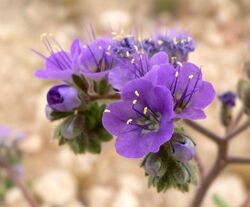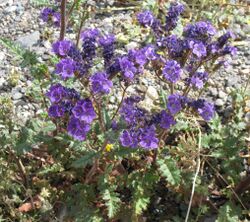Biology:Phacelia crenulata
| Phacelia crenulata | |
|---|---|

| |
| Scientific classification | |
| Kingdom: | Plantae |
| Clade: | Tracheophytes |
| Clade: | Angiosperms |
| Clade: | Eudicots |
| Clade: | Asterids |
| Order: | Boraginales |
| Family: | Boraginaceae |
| Genus: | Phacelia |
| Species: | P. crenulata
|
| Binomial name | |
| Phacelia crenulata Torr. ex S.Watson
| |
Phacelia crenulata is a species of flowering plant in the borage family, Boraginaceae. Its common names include notch-leaf scorpion-weed,[1] notch-leaved phacelia, cleftleaf wildheliotrope, and heliotrope phacelia.[2] Phacelia crenulata has an antitropical distribution, a type of disjunct distribution where a species exists at comparable latitudes on opposite sides of the equator, but not at the tropics. In North America, it is native to the southwestern United States as far east as Colorado and New Mexico, and Baja California and Sonora in Mexico.[3] In South America, it is native to southern Peru, western Bolivia, and northern Chile .[4][5]
Description
This species is an aromatic annual plant growing up to 80 centimeters tall. It is coated in stiff, glandular hairs. The leaves are 2 to 12 centimeters long, the largest occurring around the base of the stem and those higher on the stem much smaller. They are generally oblong in shape with wavy or lobed edges. The inflorescence is a coiled cyme of several flowers. The flower has a bell-shaped purple or blue corolla up to a centimeter long. The corolla has a white tube and sometimes a white throat. The stamens and style are well exserted from mouth of the flower. The fruit is a somewhat rounded capsule a few millimeters wide.[6]
Taxonomy
There are 2[3] to 5[1] varieties of the species, including:[6]
- P. crenulata var. ambigua – rangewide; purple flowers up to 10 millimeters long
- P. crenulata var. crenulata – California to Utah; purple flowers up to 7 millimeters long
- P. crenulata var. minutiflora – California, Arizona, Baja California; white-throated lavender to blue flowers up to 4 millimeters long
The varieties can intergrade in some areas.[6]
Impacts
As do many other phacelias, this species causes contact dermatitis.[7]
References
- ↑ 1.0 1.1 Phacelia crenulata. Integrated Taxonomic Information System (ITIS).
- ↑ Phacelia crenulata. Calflora.
- ↑ 3.0 3.1 {{citation | mode = cs1 | title = Phacelia crenulata | work = Germplasm Resources Information Network (GRIN) | url = | publisher = [[Organization:Agricultural Research ServAgricultural Research Service (ARS), United States Department of Agriculture (USDA) | access-date = 12 January 2018 }}
- ↑ Solbrig, O.T. l972b. The floristic disjunctions between the Monte in Argentina and the Sonoran Desert in Mexico and the United States. Annals Missouri Bot. Garden 59: 605-614.
- ↑ "Amphitropical Plant Distributions". https://www.geo.arizona.edu/Antevs/ecol438/amphitrop.html.
- ↑ 6.0 6.1 6.2 Phacelia crenulata. The Jepson Manual.
- ↑ Berry, C. Z., et al. (1962). Dermatitis venenata from Phacelia crenulata. Archives of Dermatology 85(6), 737-39.
External links
| Wikimedia Commons has media related to Phacelia crenulata. |
Wikidata ☰ Q4120494 entry
 |



